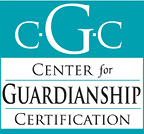Minimum Eligibility Requirements for Certification
- Be at least 21 years of age.
- Describe experience related to a minimum of three different NCG core competencies.
- Document one of the following requirements. Click here for acceptable degrees, certifications and coursework.
- Be a high school graduate or possess the GED equivalent and submit proof of 30 hours of CGC approved coursework within two years prior to the applicant applying for certification;
- Hold a licensure in guardianship or certification in a field related to guardianship (for example, CFP, CPA, CMC, CCM) and submit proof of 20 hours of CGC approved coursework within two years prior to the applicant applying for certification;
- Possess a two-year degree in a field related to guardianship (for example, social work, criminal justice, accounting, nursing) and submit proof of 10 hours of CGC approved coursework within two years prior to the applicant applying for certification;
- Possess a four-year or higher degree in a field related to guardianship (for example, law, medical, social work, psychology, finance, business) and submit proof of 10 hours of CGC approved coursework within two years prior to the applicant applying for certification.
- Submit to third-party verification and send proof of educational requirements.
- Not have been convicted of, or pled guilty or no contest to, a felony. The only two exceptions to this requirement will be court or state agency documentation of one of the following: a) expungement of the felony conviction; or b) that a court or state agency, with knowledge of the felony, has determined that the applicant or recertificant is eligible to serve as a guardian under state law.
- Submit to a criminal background check.
- Agree to comply with the NGA Ethical Principles and the NGA Standards of Practice.
- Not have been civilly liable or criminally convicted in an action that involved fraud, misrepresentation, material omission, misappropriation, moral turpitude, theft, exploitation, abuse or conversion.
- Not have been relieved of responsibilities as a guardian by a court, employer, or client for actions involving fraud, misrepresentation, material omission, misappropriation, theft, exploitation, abuse or conversion.
- Be bonded or obtain appropriate bonding insurance after certification in accordance with state statutes and local practice.
- Not have been found liable in a subrogation action by an insurance or bonding agent.
- Not have been disciplined by a state or national certification or licensing organization in any profession, unless administrative in nature (i.e. failure to renew).
- Agree to comply with CGC policies, requirements, and rules & regulations.
- Be in good standing with CGC and not have had CGC certification revoked.
- Not have provided false information through the application process.
